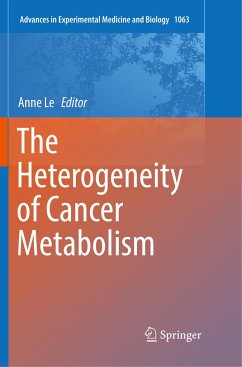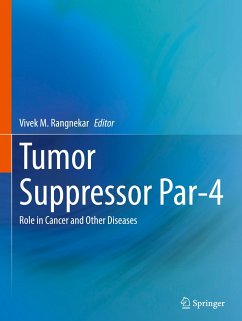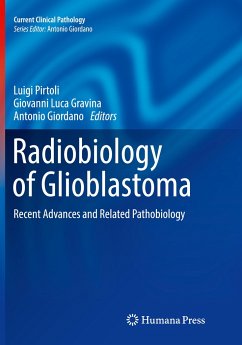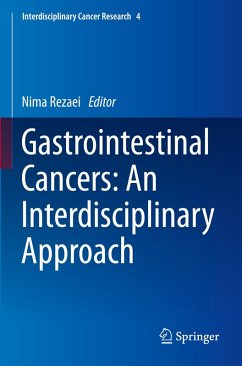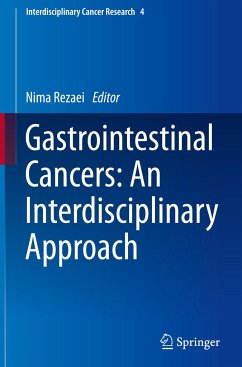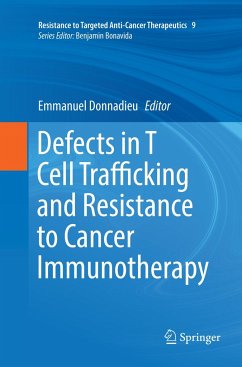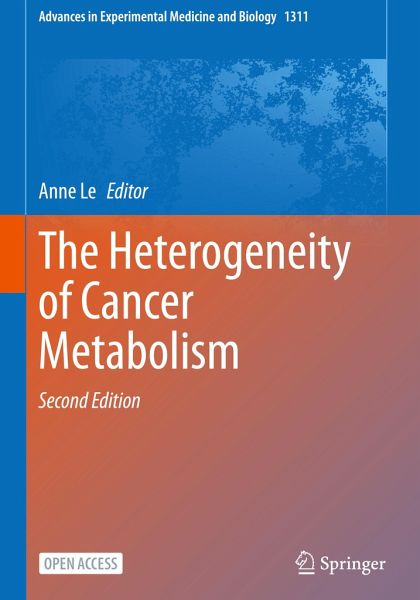
The Heterogeneity of Cancer Metabolism
Versandkostenfrei!
Versandfertig in 6-10 Tagen
38,99 €
inkl. MwSt.

PAYBACK Punkte
19 °P sammeln!
This open access volume will introduce recent discoveries in cancer metabolism since the publication of the first edition in 2018, providing readers with an up-to-date understanding of developments in the field.Genetic alterations in cancer, in addition to being the fundamental drivers of tumorigenesis, can give rise to a variety of metabolic adaptations that allow cancer cells to survive and proliferate in diverse tumor microenvironments. This metabolic flexibility is different from normal cellular metabolic processes and leads to heterogeneity in cancer metabolism within the same cancer type...
This open access volume will introduce recent discoveries in cancer metabolism since the publication of the first edition in 2018, providing readers with an up-to-date understanding of developments in the field.
Genetic alterations in cancer, in addition to being the fundamental drivers of tumorigenesis, can give rise to a variety of metabolic adaptations that allow cancer cells to survive and proliferate in diverse tumor microenvironments. This metabolic flexibility is different from normal cellular metabolic processes and leads to heterogeneity in cancer metabolism within the same cancer type or even within the same tumor. In this book, the authors delve into the complexity and diversity of cancer metabolism and highlight how understanding the heterogeneity of cancer metabolism is fundamental to the development of effective metabolism-based therapeutic strategies for cancer treatment. Deciphering how cancer cells utilize various nutrient resources will enableclinicians and researchers to pair specific chemotherapeutic agents with patients who are most likely to respond with positive outcomes, allowing for more cost-effective and personalized cancer treatment.
This book has four major parts. Part one will cover the basic metabolism of cancer cells, followed by a discussion of the heterogeneity of cancer metabolism in part two. Part three addresses the relationship between cancer cells and cancer-associated fibroblasts, and the new part four will explore the metabolic interplay between cancer and other diseases. This new section makes the book unique from other texts currently available on the market.
The second edition will be useful for cancer metabolism researchers, cancer biologists, epidemiologists, physicians, health care professionals in related disciplines, policymakers, marketing and economic strategists, among others. It may also be used in courses such as intro to cancer metabolism, cancer biology, and related biochemistry courses for undergraduate and graduate students.
Genetic alterations in cancer, in addition to being the fundamental drivers of tumorigenesis, can give rise to a variety of metabolic adaptations that allow cancer cells to survive and proliferate in diverse tumor microenvironments. This metabolic flexibility is different from normal cellular metabolic processes and leads to heterogeneity in cancer metabolism within the same cancer type or even within the same tumor. In this book, the authors delve into the complexity and diversity of cancer metabolism and highlight how understanding the heterogeneity of cancer metabolism is fundamental to the development of effective metabolism-based therapeutic strategies for cancer treatment. Deciphering how cancer cells utilize various nutrient resources will enableclinicians and researchers to pair specific chemotherapeutic agents with patients who are most likely to respond with positive outcomes, allowing for more cost-effective and personalized cancer treatment.
This book has four major parts. Part one will cover the basic metabolism of cancer cells, followed by a discussion of the heterogeneity of cancer metabolism in part two. Part three addresses the relationship between cancer cells and cancer-associated fibroblasts, and the new part four will explore the metabolic interplay between cancer and other diseases. This new section makes the book unique from other texts currently available on the market.
The second edition will be useful for cancer metabolism researchers, cancer biologists, epidemiologists, physicians, health care professionals in related disciplines, policymakers, marketing and economic strategists, among others. It may also be used in courses such as intro to cancer metabolism, cancer biology, and related biochemistry courses for undergraduate and graduate students.



